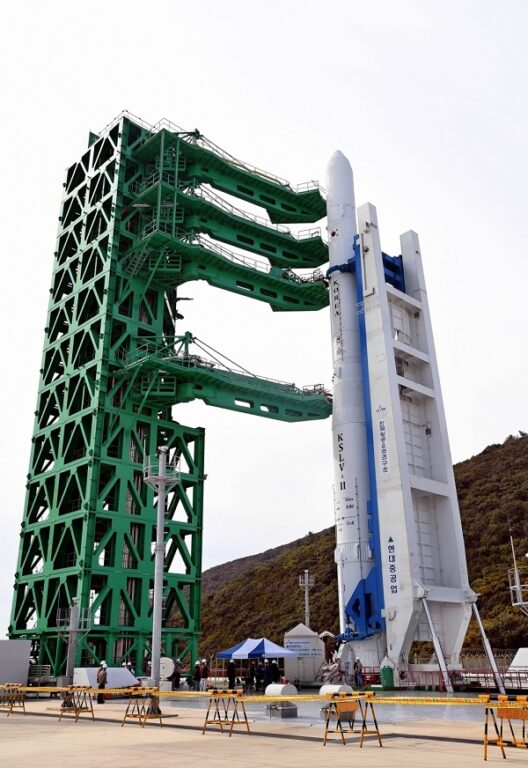Seoul, (Asian independent) South Korea’s state-run Korea Aerospace Research Institute (KARI) was carrying out final preparations on Monday ahead of this week’s second attempt to send multiple satellites into orbit.
Nuri, also known as KSLV-II, is scheduled to be transported to the launch pad and erected vertically on Tuesday at the Naro Space Centre in the country’s southern coastal village of Goheung, one day ahead of the launch, Yonhap news agency reported.
In its first attempt in October, South Korea’s first homegrown space rocket successfully flew to a target altitude of 700 kilometres but failed to put a dummy satellite into orbit as its third-stage engine burnt out earlier than expected.
Last month, the science ministry set June 15 as the second launch date for Nuri.
Jang Young-soon, head of KARI’s launcher system development team, said that the three-stage space rocket, which weighs 200 tonnes and measures 47.2 metres in height, has been fully assembled and was going through a final electrical system inspection.
Ahead of the second launch, Nuri underwent reinforcements of an anchoring device of the helium tank inside the third-stage oxidiser tank.
In October, the helium tank in the third-stage rocket fell off due to increased buoyancy during the flight and eventually caused the engine to shut off prematurely, according to a governmental committee.
“Engineers have added about 9 kilograms of reinforcements to the third-stage rocket to avoid such problems and said that the augmentation is unlikely to affect the rocket’s performance,” Jang said in a recent online press conference.
A factor that could potentially affect the schedule is the weather, as authorities forecast a 60 per cent chance of rain in the area on Tuesday afternoon. Although the rocket itself is sealed to prevent water from entering, a large amount of rain could cause logistics problems.
Rain is not expected on launch day, but Jang said wind condition is also a determining factor in the success of the launch. According to KARI, average surface wind speed must remain below 15 metres per second during the entirety of the process to ensure a successful launch.
The launch has been tentatively set at 4 p.m., but the exact time will be determined on Wednesday depending on space conditions and sunspot explosions, the report said.
Unlike the October launch, which carried a single dummy satellite, Nuri this time will be loaded with a 180-kilogram performance verification satellite to test the rocket’s capabilities and four separate cube satellites developed by four universities for academic research purposes.
“The most important mission (of the verification satellite) is testing the rocket’s (satellite) injection capacity,” said Ahn Sang-il, a senior researcher at KARI’s satellite and space exploration systems engineering team.
South Korea plans to conduct four additional Nuri rocket launches by 2027 as part of efforts to further advance the country’s space rocket programme.








